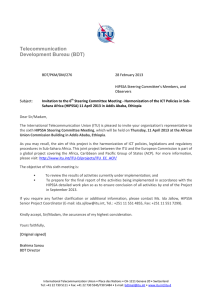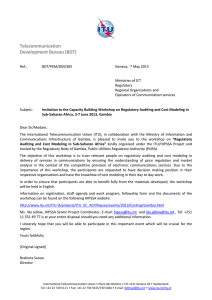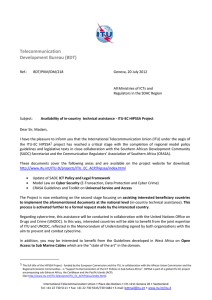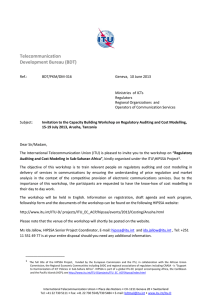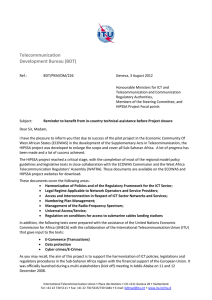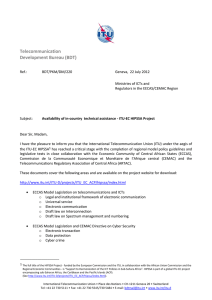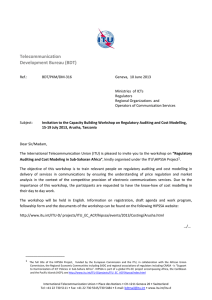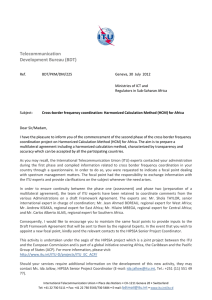HIPSSA Cost model training workshop:
advertisement
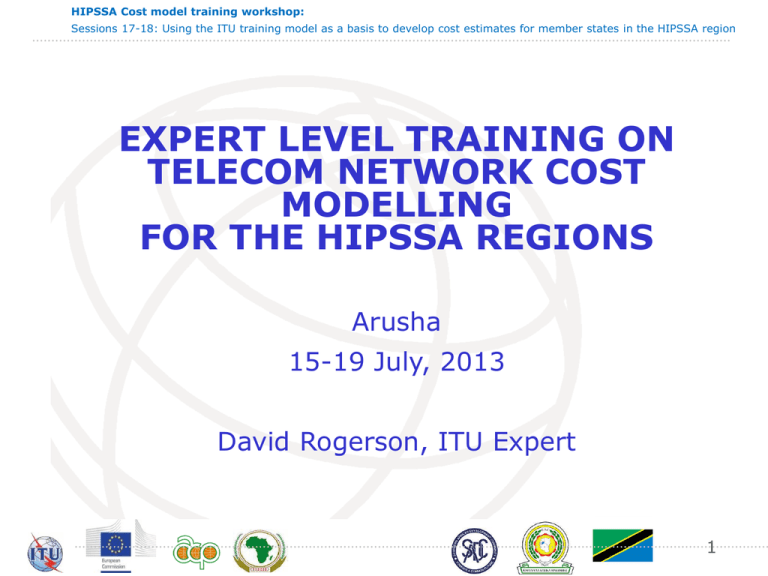
HIPSSA Cost model training workshop: Sessions 17-18: Using the ITU training model as a basis to develop cost estimates for member states in the HIPSSA region EXPERT LEVEL TRAINING ON TELECOM NETWORK COST MODELLING FOR THE HIPSSA REGIONS Arusha 15-19 July, 2013 David Rogerson, ITU Expert 1 HIPSSA Cost model training workshop: Sessions 17-18: Using the ITU training model as a basis to develop cost estimates for member states in the HIPSSA region Sessions 17/18: Using the ITU training model as a basis to develop cost estimates for member states in the HIPSSA region. 2 HIPSSA Cost model training workshop: Sessions 17-18: Using the ITU training model as a basis to develop cost estimates for member states in the HIPSSA region Agenda Aims and objectives for these sessions Describe the task Explain what is required Session 17 Work in groups Present and discuss findings Session 18 3 HIPSSA Cost model training workshop: Sessions 17-18: Using the ITU training model as a basis to develop cost estimates for member states in the HIPSSA region Background to the exercise The other exercises have been purely hypothetical; this one is closely linked with reality. The aim is to start trying to adapt the ITU training model to fit the situation in your country. To do this you might like to: Form a working group with others from your country, or Learn the principles involved by working with another group on a different country Please be aware that this is a training exercise only – the model should not be used for commercial purposes (see the worksheet entitled “Notice”) 4 HIPSSA Cost model training workshop: Sessions 17-18: Using the ITU training model as a basis to develop cost estimates for member states in the HIPSSA region The ITU Mobile Telco LRIC training model A. Model Design 1.Coverage 4. CAPEX and Direct OPEX 5. Indirect OPEX 10. Markups 7. Network costing 9. LRIC 11. LRIC+ B. Control Panel C. Reference Lists 2. Traffic 6. Network design D. Reconciliation E. Graphs 3. Network design parameters Key 8. Routing factors Cells Summary Sheets Input Sheets Calculation sheets Direct input into the model Inputs copied from other worksheets Calculation cells Output cells copied to other worksheets 5 HIPSSA Cost model training workshop: Sessions 17-18: Using the ITU training model as a basis to develop cost estimates for member states in the HIPSSA region Approach to editing the model Only change the yellow cells If in doubt, don’t change Save new versions as you go along 6 HIPSSA Cost model training workshop: Sessions 17-18: Using the ITU training model as a basis to develop cost estimates for member states in the HIPSSA region The areas you may wish to review - 1 B. Control Panel: sensitivity values in B2 C. Reference Lists: The red text highlights the areas that must be changed provinces, years, currency 1. Subscribers and coverage: Coverage in 1.01 Subscribers and market share in 1.02 2. Traffic: Traffic volumes of specific operator in 2.01 Average non-billed traffic factors (2.02) and split by geotype (2.06) 7 HIPSSA Cost model training workshop: Sessions 17-18: Using the ITU training model as a basis to develop cost estimates for member states in the HIPSSA region The areas you may wish to review - 2 3. Network design parameters: 3.01 radio network parameters 3.02 BTS cell radii 3.04 -3.07 BTS parameters; Network design capacity; Transmission parameters; Routing factors 4. Capex and Direct Opex: 4.01 network equipment capex and opex 4.02 and 4.03 transmission costs 4.04 Licence fees 5. Indirect opex The red text highlights the areas that must be changed 5.01 Telco actuals 5.04 Interconnection charges 8 HIPSSA Cost model training workshop: Sessions 17-18: Using the ITU training model as a basis to develop cost estimates for member states in the HIPSSA region Suggested approach 1. Change anything you can based on your local knowledge or information Highlight the changed data (different colour) and save the model 2. Search for online data sources (e.g. regions, population, subscriber numbers) and input data Again highlight the changed data and save the model 3. Estimate other input data as best you can (e.g. coverage based on landmass; change traffic data in proportion to subscribers) Again highlight the changes Use a different colour to identify data that needs to be confirmed later 9 HIPSSA Cost model training workshop: Sessions 17-18: Using the ITU training model as a basis to develop cost estimates for member states in the HIPSSA region Proposed outputs When you have completed the model to your satisfaction, prepare a short presentation for the group Include the following: The changes you have made to the ITU training model The draft model results – compare the cost-based outcome with current mobile termination rates for each mobile operator. How confident are you in the cost model results – test the sensitivity of your assumptions Which input data you would like to verify with operators. 10 HIPSSA Cost model training workshop: Sessions 17-18: Using the ITU training model as a basis to develop cost estimates for member states in the HIPSSA region Group work and presentations 11
